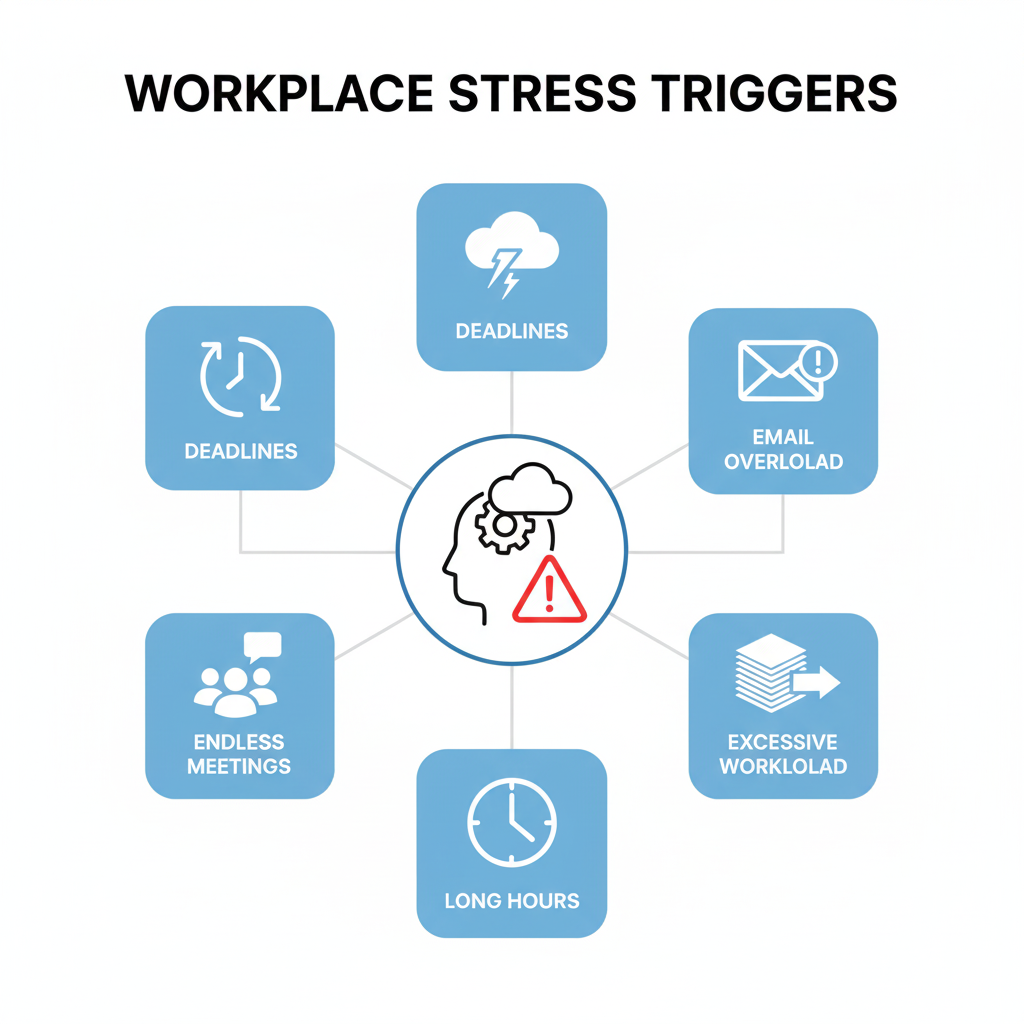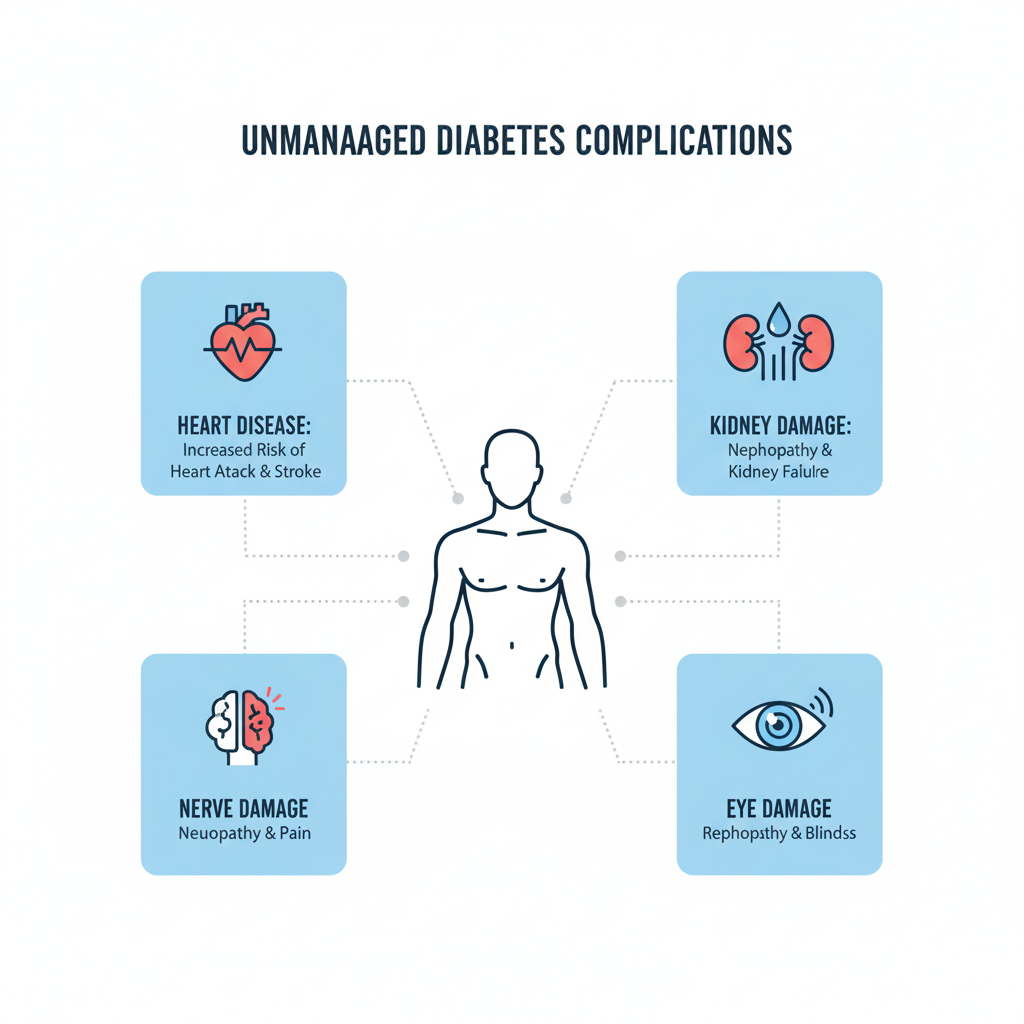Introduction
India’s workforce is the backbone of the nation’s economic growth, but behind the glowing screens, endless meetings, long commutes, and rising corporate expectations lies a dangerous and silent health threat: workplace stress leading to diabetes. With India already known as the “diabetes capital of the world,” the rapid increase in diabetes cases among young and middle-aged professionals is alarming.
High-pressure work environments, long working hours, tight deadlines, job insecurity, limited physical activity, unhealthy eating habits, lack of sleep, and chronic mental fatigue all contribute to rising blood sugar levels. Employees in corporate offices, IT companies, startups, financial institutions, manufacturing units, and service industries are increasingly reporting symptoms of diabetes in their 20s, 30s, and early 40s.
This article explores why workplace stress is deeply linked to diabetes, how stress hormones alter blood sugar, the lifestyle habits that worsen this risk, the impact on India’s working-age population, early warning signs, prevention strategies, and when to seek medical help. Written in easy, relatable language, this guide is tailored for Indian professionals navigating hectic routines.

Understanding Workplace Stress
Workplace stress is the emotional, physical, and mental strain caused by job-related pressures. While occasional stress is normal, chronic stress affects the body profoundly.
Common triggers include:
-
Tight deadlines
-
Long working hours
-
High workload
-
Unrealistic targets
-
Poor work-life balance
-
Lack of recognition
-
Job insecurity
-
Toxic work culture
-
Long commute times
-
Shift work or night duty
-
Constant digital overload
Chronic workplace stress disrupts hormones, sleep, and metabolism, creating the perfect environment for diabetes to develop.
How Workplace Stress Increases Diabetes Risk
Stress affects the body through powerful biochemical pathways. When stressed, the body releases “fight or flight” hormones such as cortisol, adrenaline, and noradrenaline.
These hormones:
-
Increase blood sugar levels
-
Reduce insulin sensitivity
-
Increase inflammation
-
Slow metabolism
-
Increase abdominal fat
-
Raise blood pressure
-
Increase cravings for sugar or carbs
This chain reaction directly increases the risk of Type 2 diabetes.
Even people who eat well and exercise may experience rising sugar levels due to chronic stress.
Cortisol: The Stress Hormone Behind Rising Blood Sugar
Cortisol plays a major role in metabolism and blood sugar regulation. In stressful workplaces, cortisol is constantly elevated.
Effects of high cortisol include:
-
Increased glucose production
-
Reduced insulin effectiveness
-
More belly fat
-
Frequent fatigue
-
Irregular sleep patterns
-
Increased hunger
-
Higher risk of metabolic syndrome
The longer cortisol stays high, the stronger the risk of prediabetes and diabetes.
Impact of Long Working Hours on Diabetes Risk
India has one of the highest average work hours globally.
Long working hours lead to:
-
Less time for meals
-
More snacking
-
Reduced physical activity
-
Increased fatigue
-
Poor sleep
-
Higher stress
Employees working 10–12 hours daily have almost double the diabetes risk compared to those working 6–8 hours.
Sedentary Lifestyle and Diabetes Among India’s Workforce
Most Indian professionals sit for 8–12 hours a day. Sedentary behaviour reduces calorie burn and slows metabolism.
Long hours of sitting cause:
-
Weight gain
-
Poor posture
-
Increased abdominal fat
-
Sluggish blood circulation
-
Reduced insulin sensitivity
-
Higher stress and fatigue
Even 30 minutes of sitting still reduces muscle activity significantly.
Unhealthy Eating Habits in the Workplace
Office culture often revolves around tea breaks, snacks, parties, and irregular meals.
Common unhealthy habits:
-
Skipping breakfast
-
Late-night dinners
-
Junk food deliveries
-
Sugary tea/coffee
-
Packed biscuits/chips
-
High-calorie cafeteria meals
-
Weekend overeating after a stressful week
Daily consumption of high-glycaemic foods leads to sugar spikes and insulin resistance.
The Role of Mental Health in Diabetes Risk
Mental health issues like anxiety, burnout, depression, and emotional exhaustion can directly increase diabetes risk.
Effects include:
-
Emotional eating
-
Reduced motivation to exercise
-
Poor sleep
-
Higher cortisol
-
Hormonal fluctuations
Employees with untreated mental health issues are more likely to develop metabolic disorders.

How Lack of Sleep Affects Blood Sugar
Many professionals sleep less than 6 hours due to workload, screen time, or stress. Sleep is essential for metabolism and hormone regulation.
Sleep deprivation causes:
-
Increased cortisol
-
Higher blood sugar
-
Increased hunger
-
Poor decision-making
-
Reduced insulin sensitivity
Just 3 nights of poor sleep can significantly raise blood sugar levels.
The Risk Among India’s Working-Age Adults
India’s workforce aged 25–45 is seeing a rapid rise in diabetes cases.
Reasons:
-
High-intensity jobs
-
Competitive corporate environment
-
Shift work and night shifts
-
Digital stress
-
Social pressure
-
Financial commitments
-
Modern sedentary living
More than 60% of corporate employees report at least one risk factor for diabetes.
Industries With Highest Risk
-
IT and software
-
Finance and banking
-
Customer support/BPO
-
Healthcare workers
-
Travel and tourism
-
Retail and sales
-
Startups
-
Teaching and academia
Night-shift workers are at highest risk due to circadian rhythm disruption.
Early Warning Signs of Workplace Stress-Induced Diabetes
Employees may mistake early symptoms for tiredness. Warning signs include:
-
Frequent hunger
-
Sugar cravings
-
Weight gain
-
Fatigue
-
Slow healing of wounds
-
Frequent urination
-
Excessive thirst
-
Mood swings
-
Migraines
-
Brain fog
-
Tingling in hands/feet
-
Sleep issues
-
Low energy after meals
Ignoring these signs can lead to prediabetes or diabetes.
Diagnosis and Medical Tests
Doctors may recommend:
-
Fasting blood sugar
-
Post-meal blood sugar
-
HbA1c test
-
Cholesterol profile
-
Liver function test
-
Kidney test
-
Thyroid profile
-
Vitamin D & B12 levels
-
ECG if palpitations occur
Early testing can help prevent serious complications.
Preventing Diabetes Caused by Workplace Stress
Small lifestyle changes can make a big difference.
Practical Stress Management Strategies
-
Deep breathing exercises
-
Yoga and stretching
-
10-minute walking breaks
-
Delegating tasks
-
Setting work boundaries
-
Avoiding perfectionism
-
Taking short breaks
-
Listening to calming music
-
Practicing mindfulness
Healthy Eating Habits for Working Adults
-
Eat breakfast daily
-
Carry home-cooked meals
-
Choose low-carb snacks
-
Avoid sugary tea/coffee
-
Maintain fixed meal timings
-
Drink enough water
-
Add fruits and nuts
ALSO READ: Why Hepatitis A Deserves A Place In India's Universal Immunisation Programme
Exercise Tips for Busy Professionals
-
Walk 5–10 minutes every hour
-
Do desk exercises
-
Take stairs instead of lifts
-
Try resistance band workouts
-
Follow 20–30 minute home workouts
-
Weekend outdoor activities
Correcting Sleep Habits
-
Sleep 7–8 hours
-
Reduce screen time
-
Maintain fixed sleeping schedule
-
Avoid late-night meals
-
Use dim lights
-
Avoid caffeine at night
When to See a Doctor
Seek help if you experience:
-
Persistent fatigue
-
Sudden weight gain
-
Constant stress
-
Irregular sleep
-
High BP
-
Anxiety or depression
-
Frequent thirst or urination
-
Family history of diabetes
Early treatment prevents severe complications.

Long-Term Complications if Not Managed
If workplace stress and diabetes risks are ignored, complications may include:
-
Heart disease
-
Kidney disease
-
Eye problems
-
Nerve damage
-
High blood pressure
-
Stroke
-
Reduced work productivity
-
Mental burnout
-
Early disability
50 FAQs on Workplace Stress & Diabetes
-
Why does workplace stress increase diabetes risk?
Chronic stress raises cortisol, increasing blood sugar. -
Can long working hours cause diabetes?
Yes, extended hours increase fatigue and insulin resistance. -
Does sitting too long affect sugar levels?
Yes, sitting reduces metabolism and increases diabetes risk. -
Can stress cause diabetes even in healthy people?
Yes, chronic stress can lead to insulin resistance. -
Why is diabetes rising among young Indian professionals?
Workload, sedentary habits, poor diet, and stress. -
Does skipping meals increase diabetes risk?
Yes, it causes sugar fluctuations. -
Can night shifts lead to diabetes?
Night shifts disrupt circadian rhythm, raising risk. -
Are IT professionals at high risk?
Yes, due to long sitting hours and screen stress. -
Can stress cause prediabetes?
Yes, stress hormones increase insulin resistance. -
Do stress-relief techniques help?
Yes, they lower cortisol and improve sugar control. -
What is the best exercise for office workers?
Walking, stretching, and short home workouts. -
Does sleep affect blood sugar?
Yes, poor sleep increases sugar levels. -
Does tea/coffee increase diabetes risk?
Excess sugary tea/coffee contributes to weight gain. -
Can office snacks cause diabetes?
Frequent sugary or fried snacks increase risk. -
Does emotional eating worsen sugar levels?
Yes, it causes glucose spikes. -
Can meditation lower diabetes risk?
Yes, by reducing stress. -
Is workplace burnout harmful to health?
Yes, it increases cortisol and diabetes risk. -
Do women face more workplace stress-related diabetes?
Women experience hormonal and workload factors. -
Does job insecurity increase diabetes risk?
Yes, it increases mental stress. -
Can frequent deadlines cause high sugar?
Yes, they cause repeated cortisol surges. -
Does obesity increase workplace diabetes risk?
Yes, especially abdominal fat. -
How does financial stress affect diabetes?
It increases emotional tension and sugar levels. -
Can long commutes contribute to diabetes?
Yes, they reduce relaxation and exercise time. -
Are people with hypertension at higher risk?
Yes, stress affects both BP and sugar. -
Do mobile screens affect sleep and sugar?
Yes, blue light disrupts sleep and metabolism. -
What office habits prevent diabetes?
Water breaks, walking, healthy snacks. -
Should working professionals get annual blood tests?
Yes, especially aged 25 and above. -
Do corporate wellness programs help?
Yes, they reduce stress and improve activity. -
Can breathing exercises control stress levels?
Yes, they calm the nervous system. -
Are startup employees at higher risk?
Yes, due to long hours and pressure. -
Can workplace bullying raise sugar?
Yes, it increases chronic stress. -
Does lack of sunlight affect hormones?
Yes, reducing vitamin D and affecting insulin. -
Does dehydration affect sugar?
Yes, it increases glucose concentration. -
Can work-from-home cause diabetes risk?
Yes, due to inactivity and irregular meals. -
Can stress cause weight gain?
Yes, cortisol increases appetite. -
Are freelancers also at risk?
Yes, due to irregular routine and stress. -
Can technology overload cause stress?
Yes, leading to hormonal imbalance. -
Does frequent travel increase diabetes risk?
Yes, due to disrupted routine and diet. -
Does high sugar automatically mean diabetes?
Not always—tests are needed. -
Can stress cause BP and sugar together?
Yes, both rise under pressure. -
How does sleep improve sugar control?
It balances hormones and metabolism. -
Does laughter reduce stress?
Yes, it lowers cortisol. -
Can employees reverse prediabetes?
Yes, with lifestyle changes. -
Should employees get mental health support?
Yes, it reduces stress-related disease. -
Can stress affect thyroid?
Yes, causing metabolism issues. -
Are managers more at risk?
Leadership roles often carry higher stress. -
Can yoga prevent diabetes?
Yes, by improving metabolism and reducing stress. -
Should companies promote wellness breaks?
Yes, they reduce chronic disease risk. -
Can stress-triggered diabetes be controlled?
Yes, with proper lifestyle and medical care. -
When should a stressed employee see a doctor?
Persistent fatigue, high sugar, sleep issues, or anxiety.
Conclusion
Workplace stress has become a serious health concern for India’s working-age adults. Long hours, lifestyle changes, mental pressure, and sedentary habits contribute heavily to rising diabetes cases. But with early awareness, simple routines, healthy eating, stress reduction, and regular medical screening, diabetes caused by workplace stress can be prevented or effectively managed.
Taking care of your health is not a luxury — it’s essential for long-term career success, productivity, and quality of life.
Quickobook CTA
If you're noticing stress-related symptoms or early signs of diabetes, book a consultation with a General Physician, Endocrinologist, or Diabetologist on Quickobook.
Fast appointments. Verified doctors. Convenient follow-ups.
Disclaimer:
This blog is for educational purposes only. It should not replace medical consultation. Always consult a doctor for personalized guidance.










Comments (0)
No comments yet. Be the first to share your thoughts!
Leave a Comment